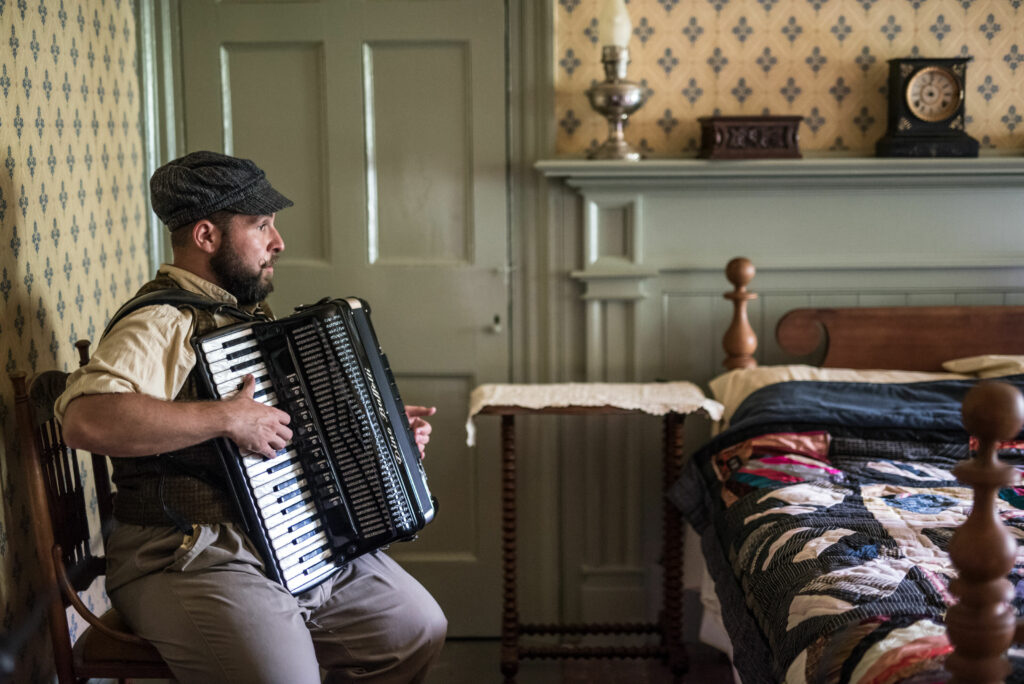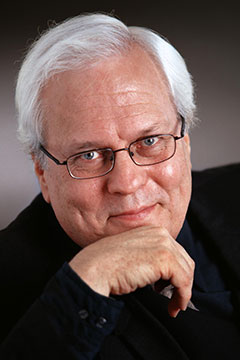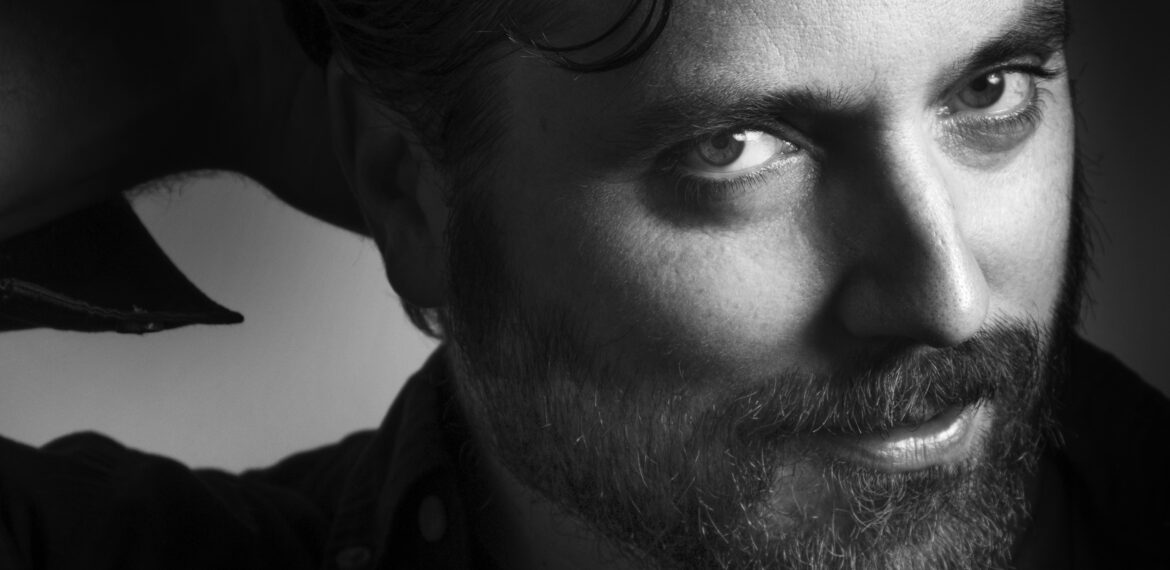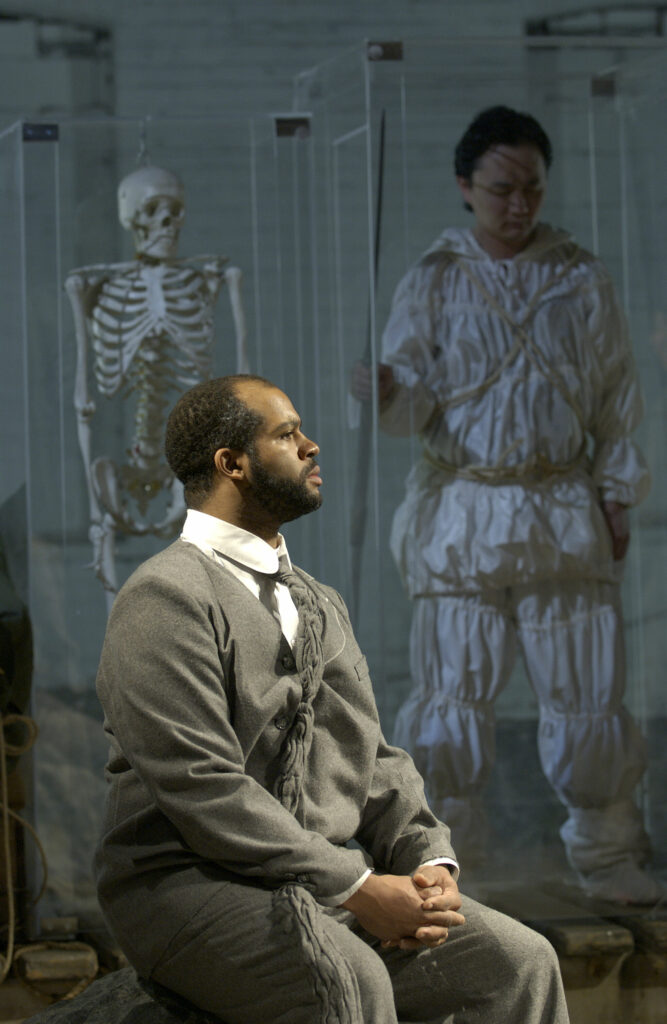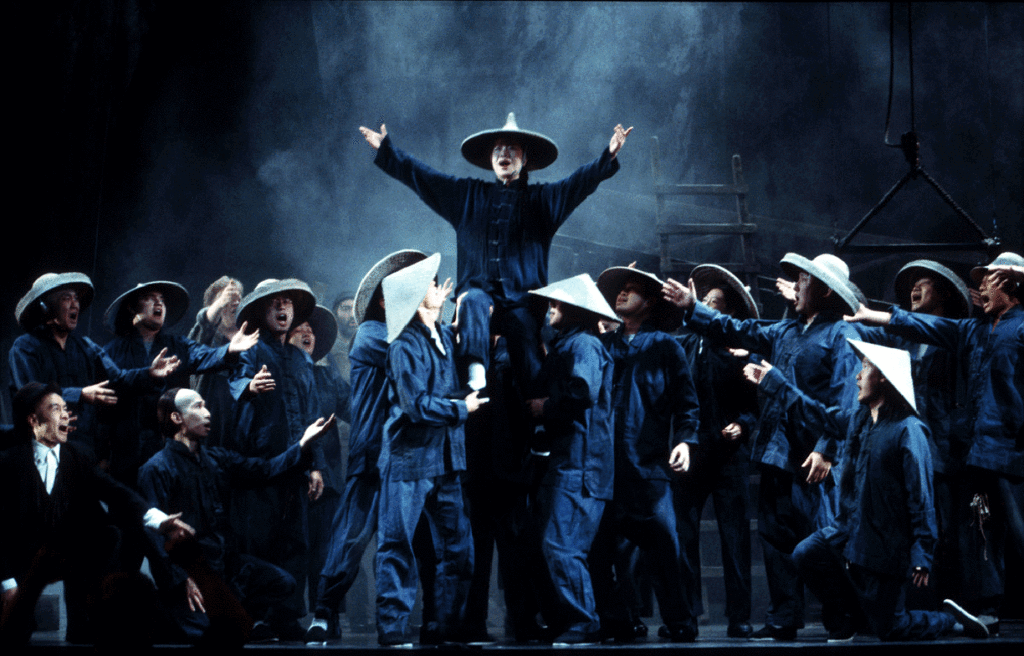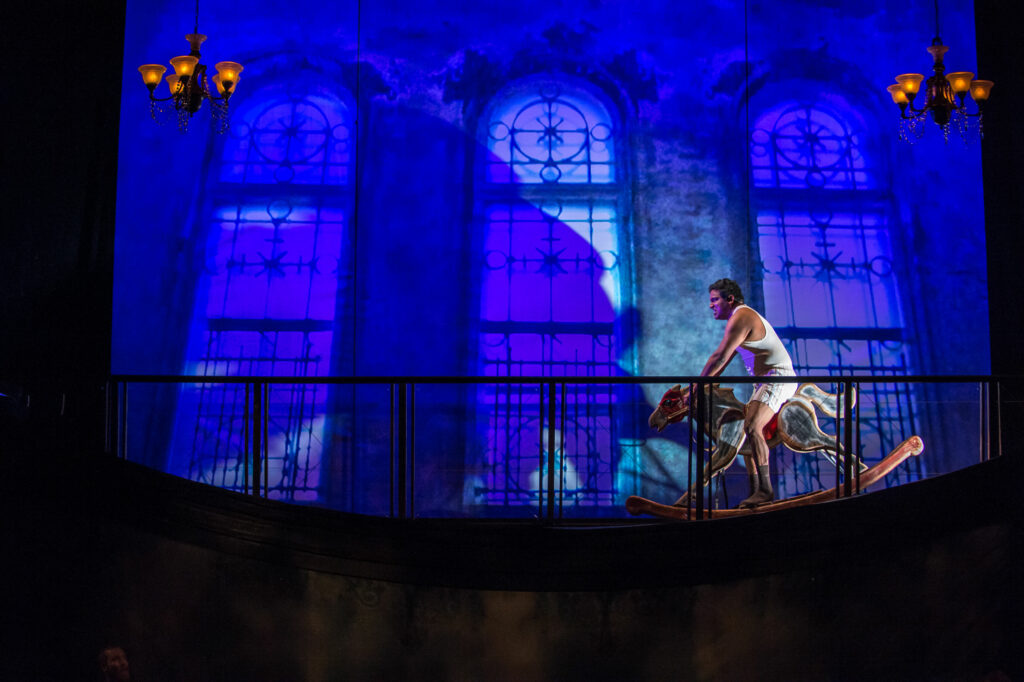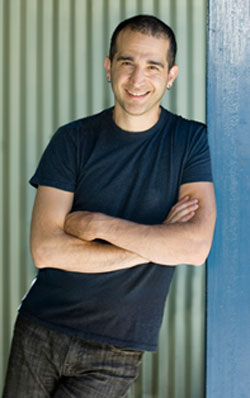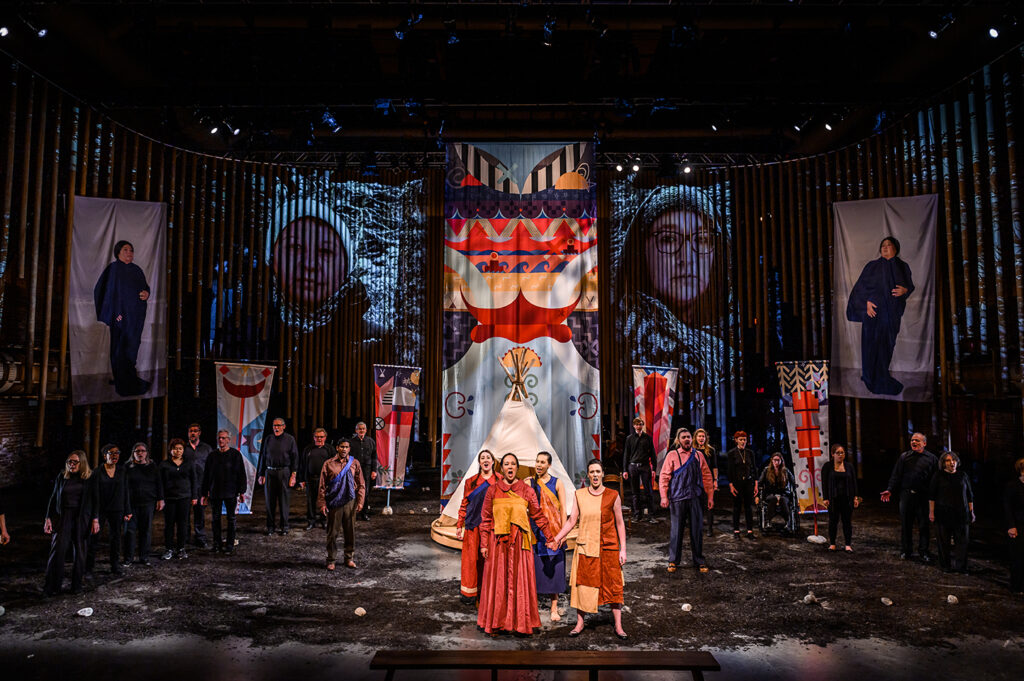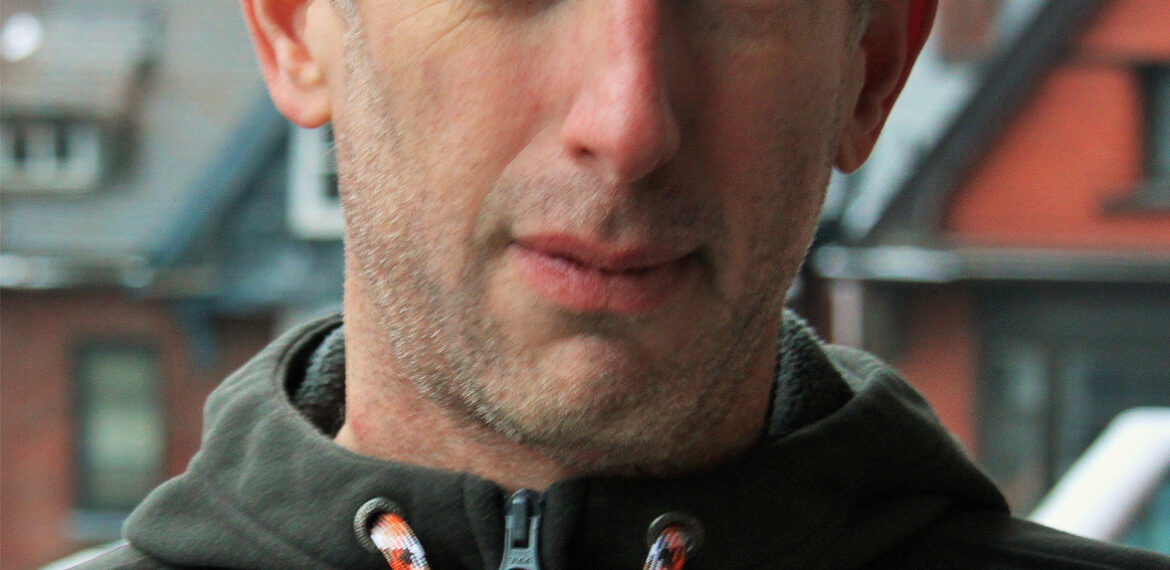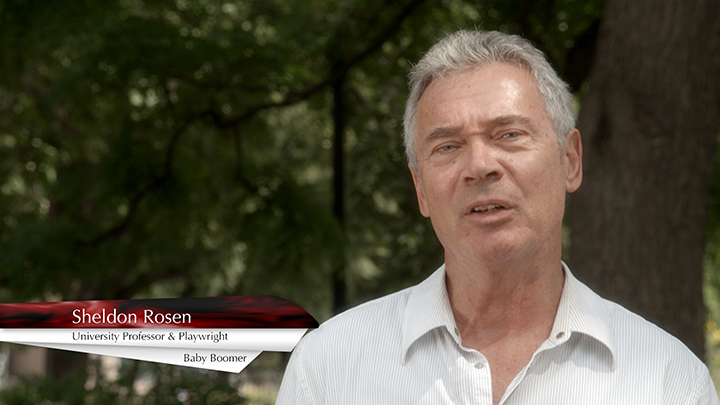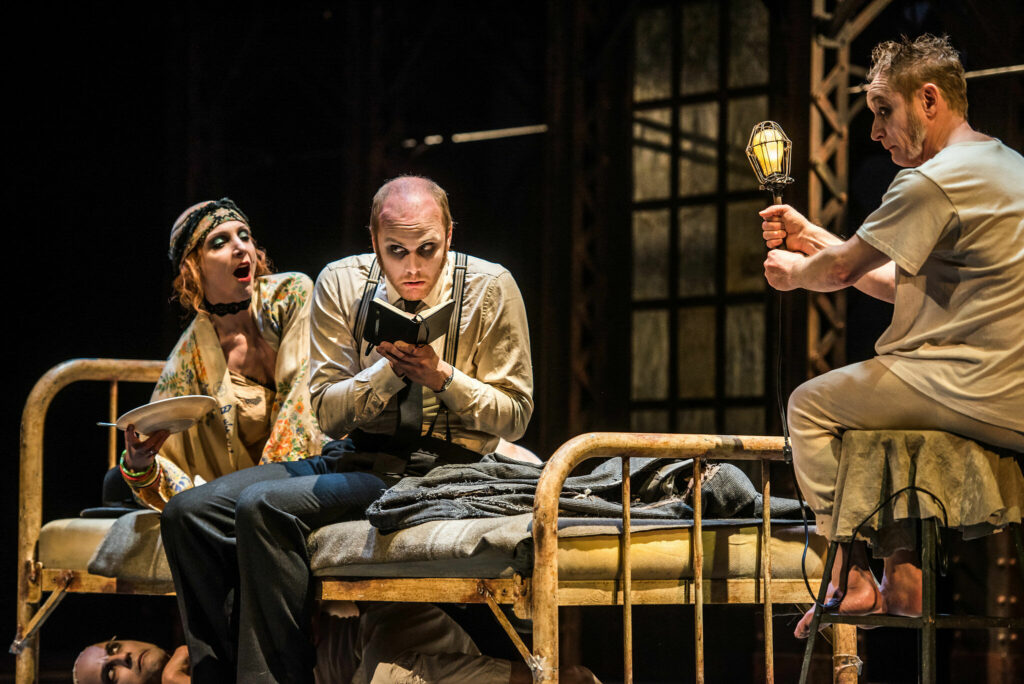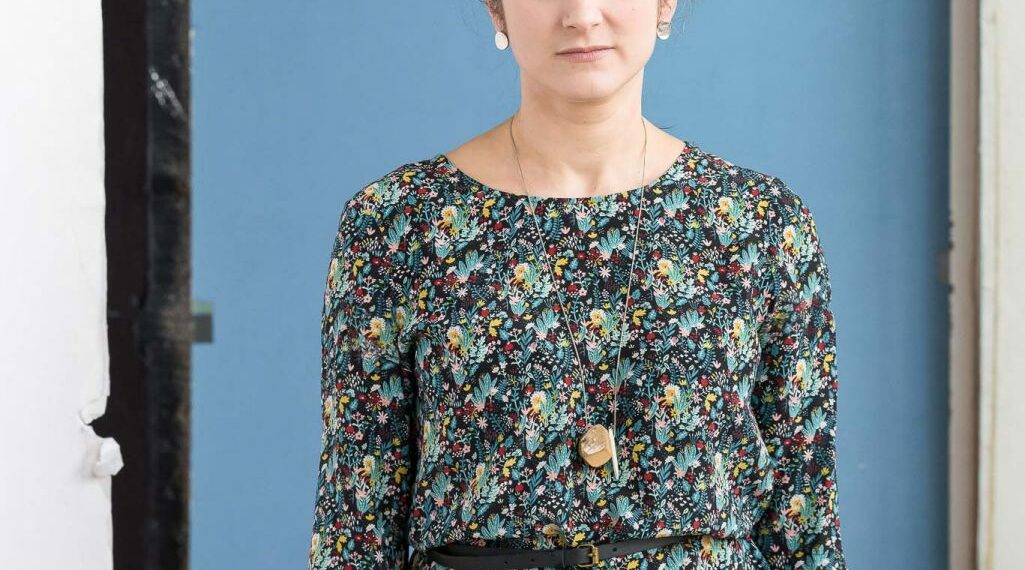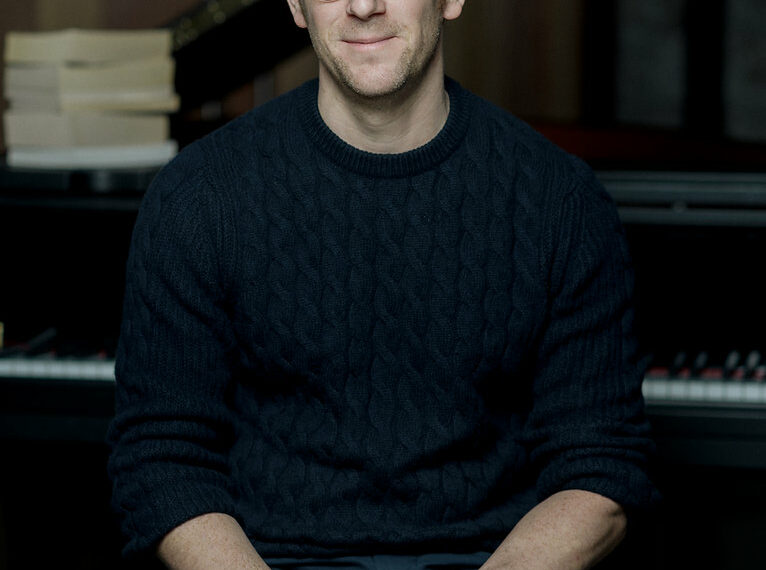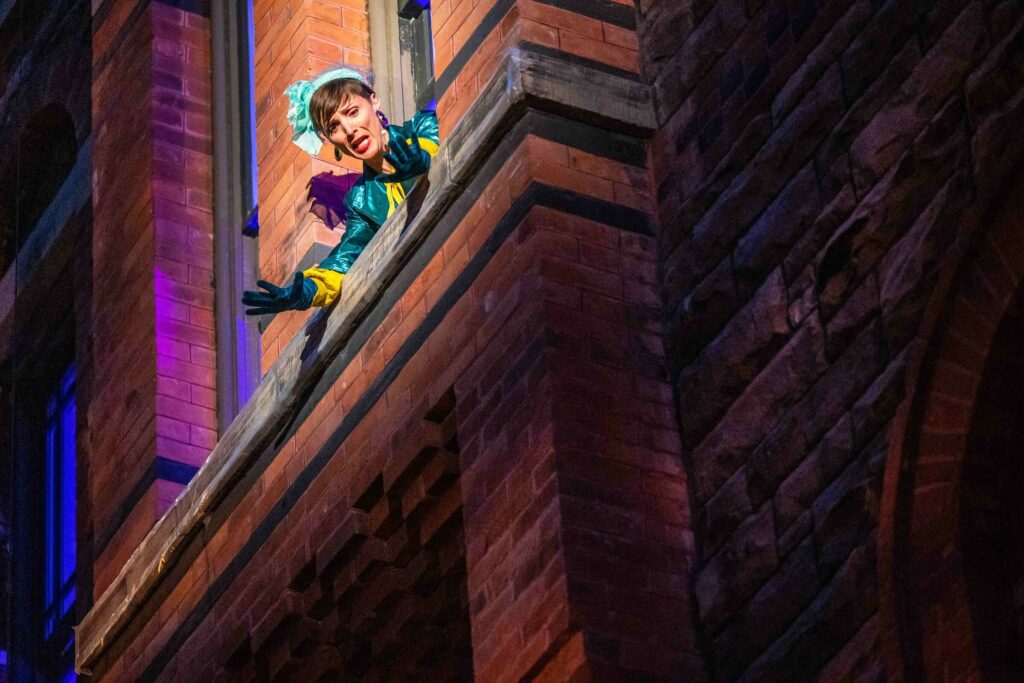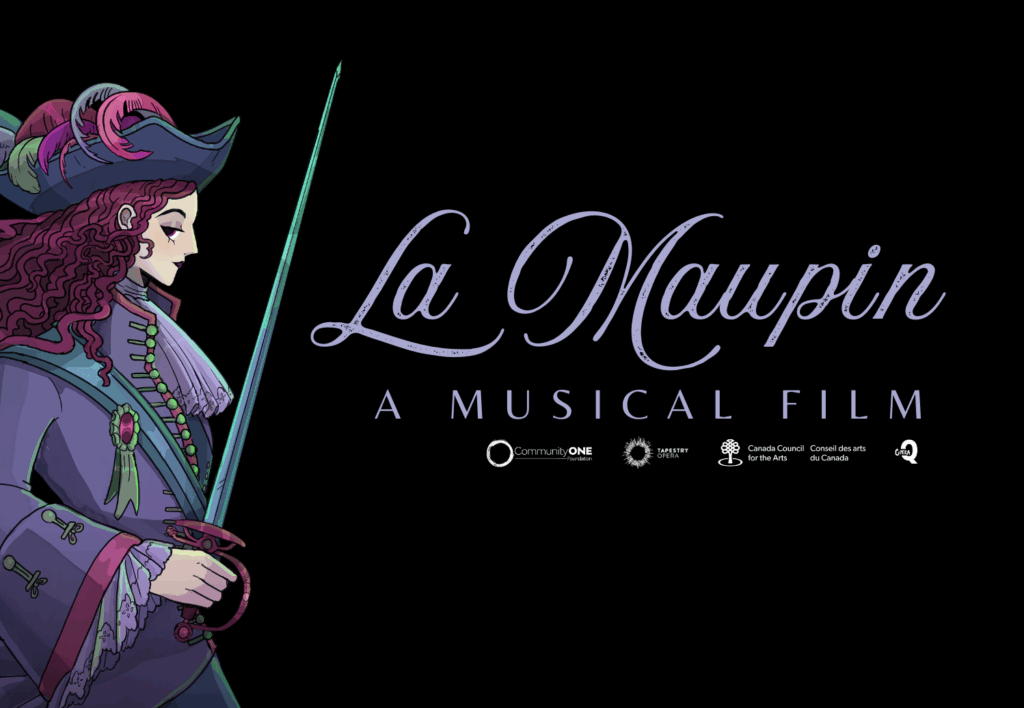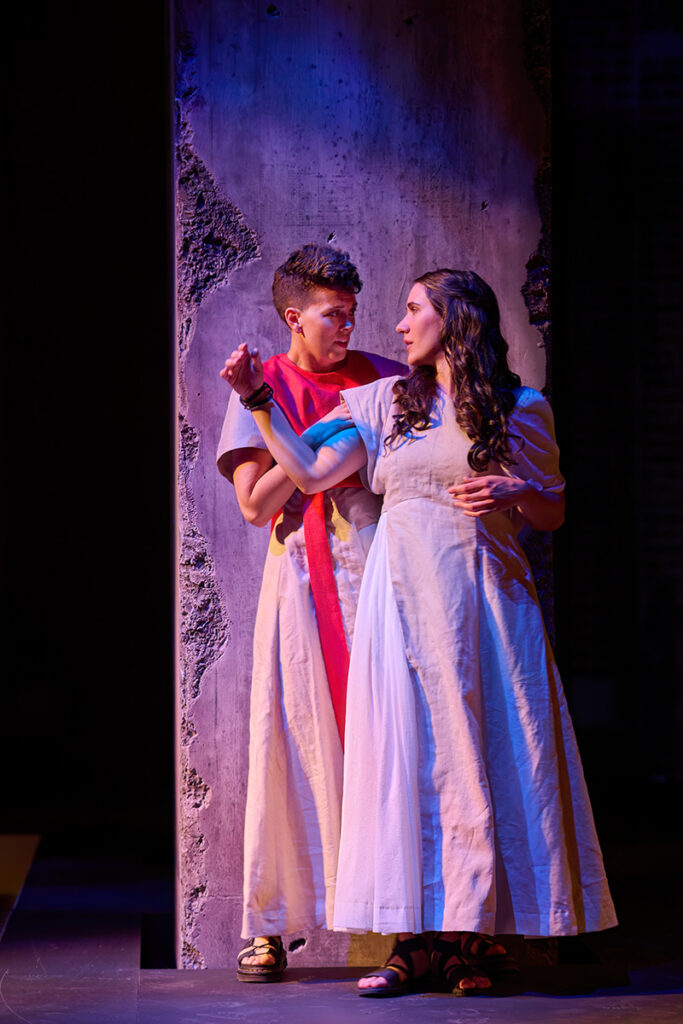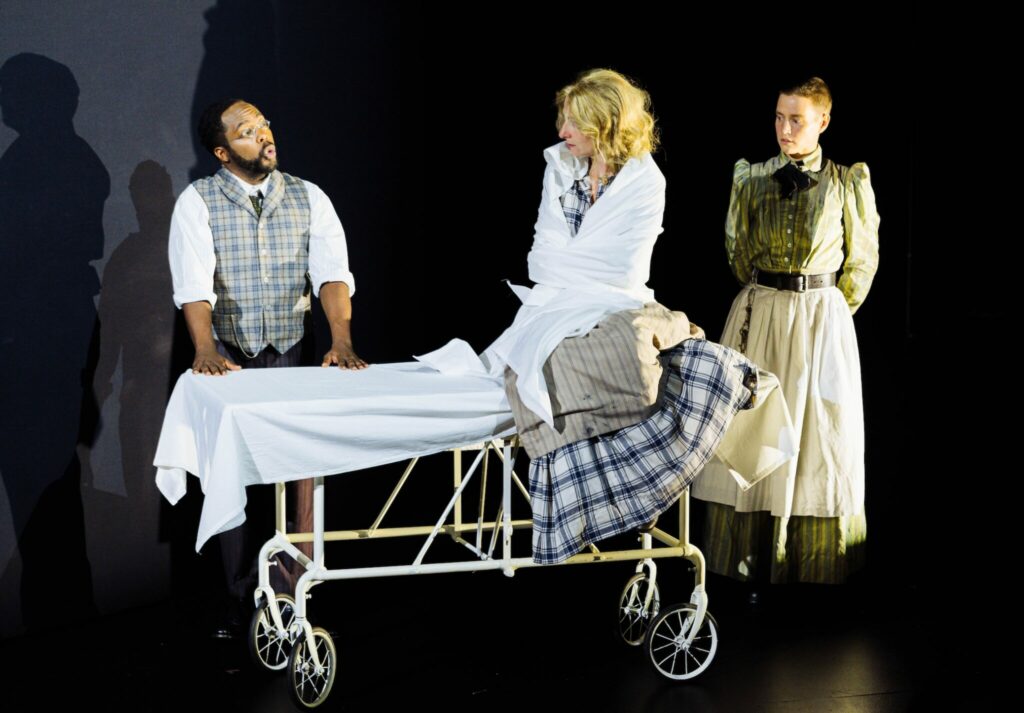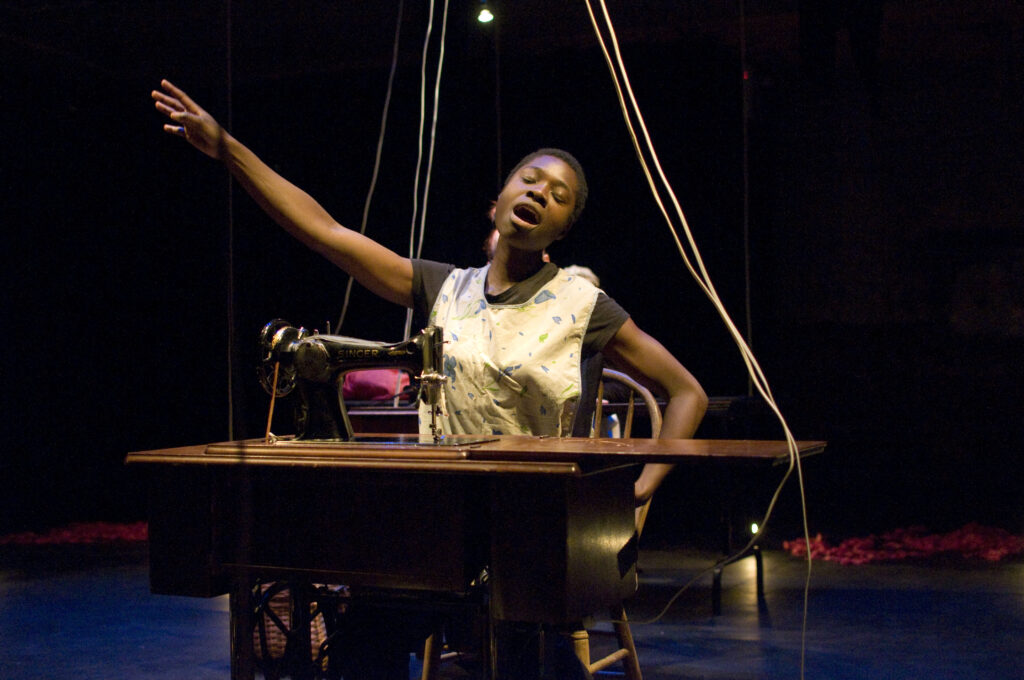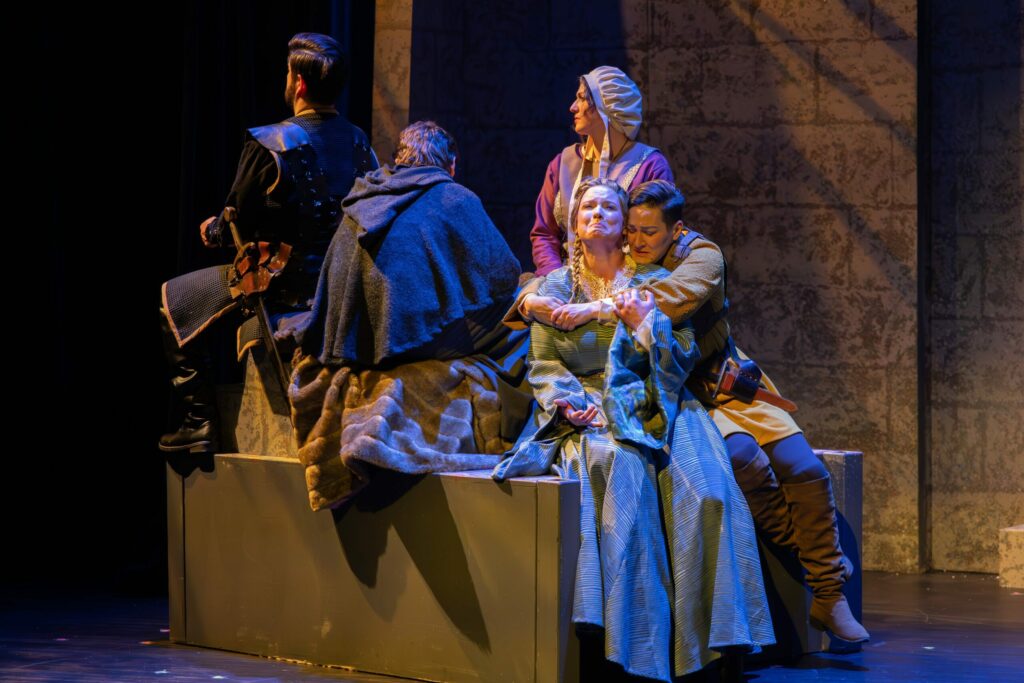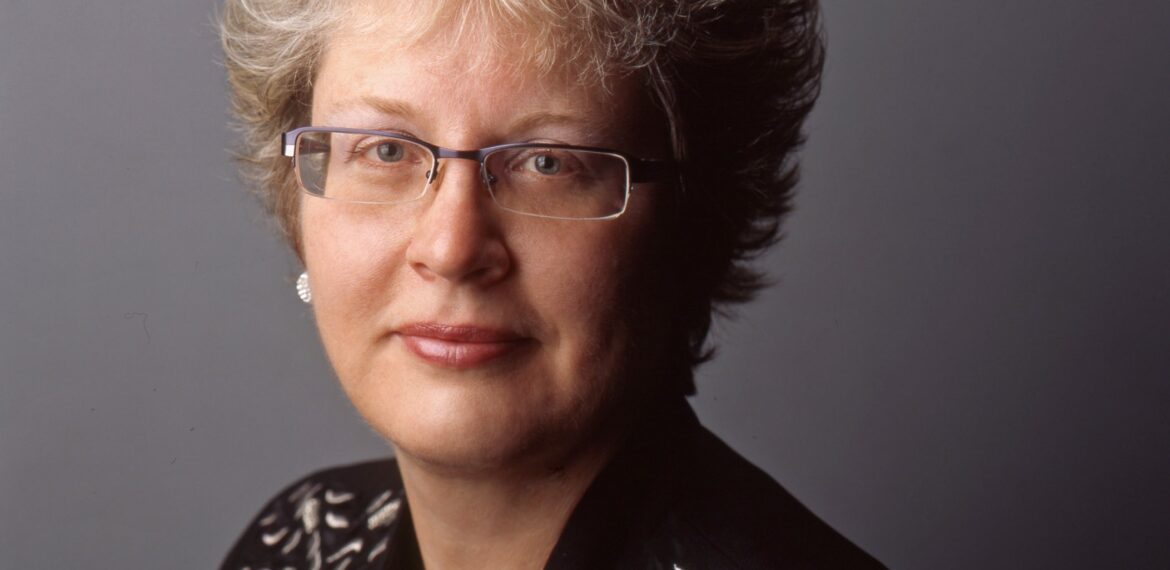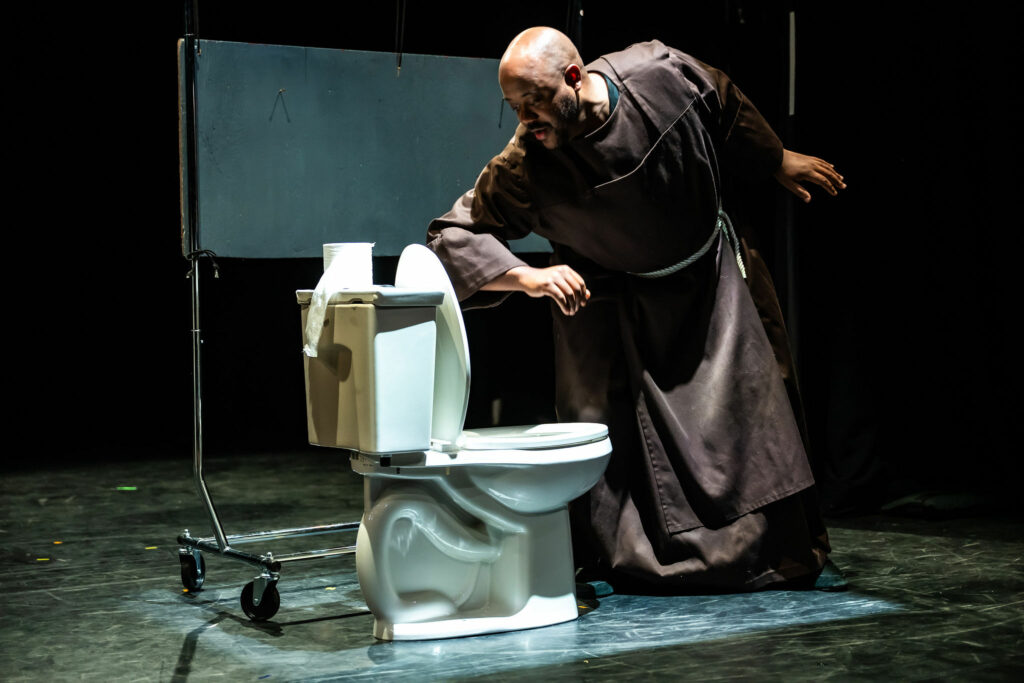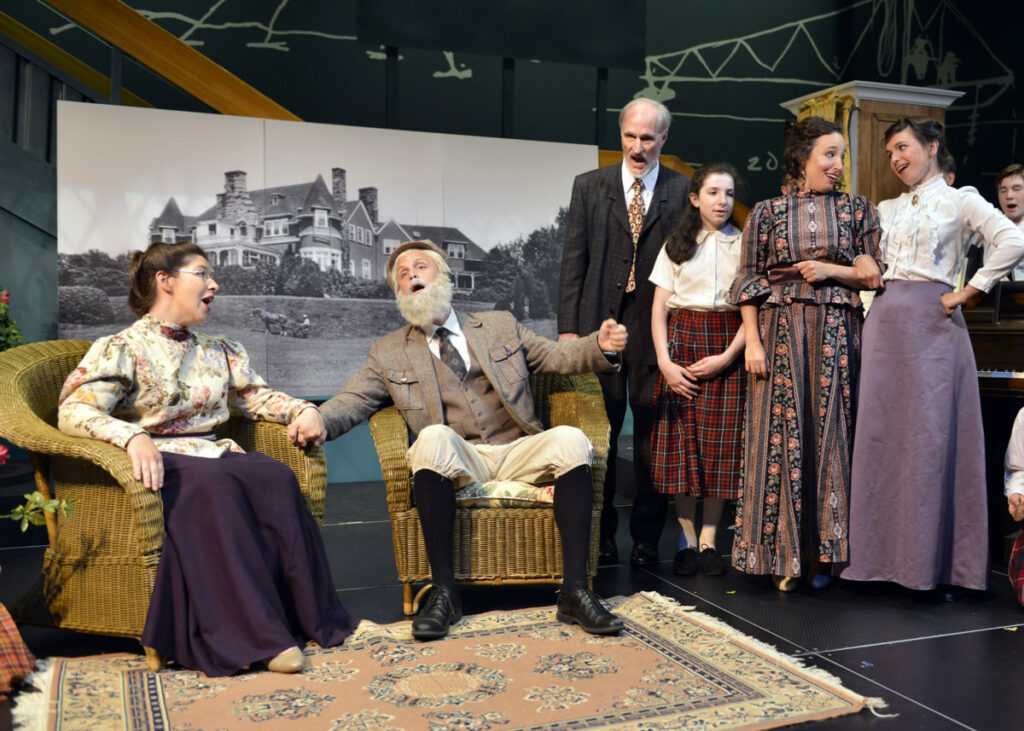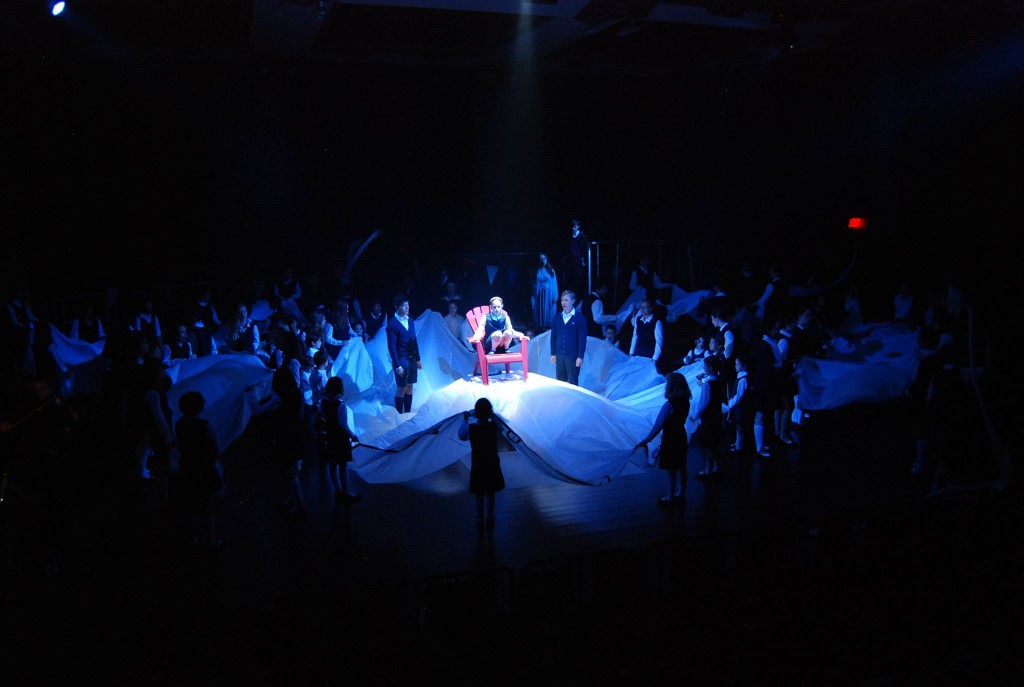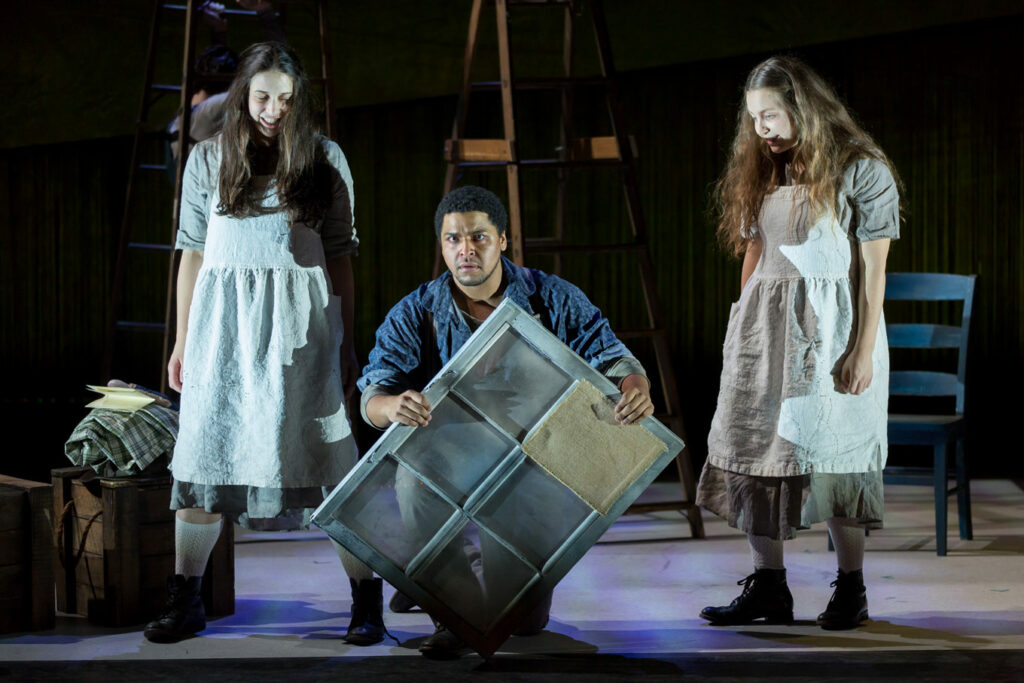Canadian Opera Resource
Canadian Opera Resource
COR
Operas
The Don Valley. 1880, Toronto.
Join George Taylor and the travelling Gilbert & Sullivan theatrical troupe The Vagabonds in a twenty-fifth anniversary celebration of the birth of his papermill. Unbeknownst to him, Jeremiah - the leader of a local small-potatoes bandit group called The Rift Rafters - just discovered a long-hidden secret abo...
Join George Taylor and the travelling Gilbert & Sullivan theatrical troupe The Vagabonds in a twenty-fifth anniversary celebration of the birth of his papermill. Unbeknownst to him, Jeremiah - the leader of a local small-potatoes bandit group called The Rift Rafters - just discovered a long-hidden secret abo...
Composer: Benton Roark
Librettist: Julie Tepperman
Constantinople explores a city that was, for centuries, a centre of globe-altering events and iconic battles of religion and politics. The work explores the crossing of faith and secularism, East and West, ancient ritual and modern practice. This is a multidisciplinary work bridging a number of media.
Composer: Christos Hatzis
Librettist: John Murrell
Content warning: illness, death, HIV/AIDS
Dark Star Requiem is a poetic chronicle of the 25 years (as of 2010) of HIV-AIDS, reflecting the many faces of the disease and those affected by the pandemic.
Dark Star Requiem is a poetic chronicle of the 25 years (as of 2010) of HIV-AIDS, reflecting the many faces of the disease and those affected by the pandemic.
Composer: Andrew Staniland
Librettist: Jill Battson
Content warning: illness, death, colonialism
Facing South is inspired by the life story of American Arctic explorer, Rear Admiral Robert Edwin Peary, and his contested discovery of the North Pole in 1909. The opera takes place in the inner landscape of Peary’s mind during the last hours of his life in February 1920, as he lies dying of pernic...
Facing South is inspired by the life story of American Arctic explorer, Rear Admiral Robert Edwin Peary, and his contested discovery of the North Pole in 1909. The opera takes place in the inner landscape of Peary’s mind during the last hours of his life in February 1920, as he lies dying of pernic...
Composer: Linda Catlin Smith
Librettist: Don Hannah
Content warning: racism, colonialism, violence, death
In 1880’s China, Lai Gwan, a young impoverished woman, stands on the brink of momentous change. Her dying mother urges her to respect and honour the memory of her father, Manli, whose disappearance to the New World haunts them both.
Armed with the hope that she will find her father aliv...
In 1880’s China, Lai Gwan, a young impoverished woman, stands on the brink of momentous change. Her dying mother urges her to respect and honour the memory of her father, Manli, whose disappearance to the New World haunts them both.
Armed with the hope that she will find her father aliv...
Composer: Ka Nin Chan
Librettist: Mark Brownell
Partition in 1947 drives Naila’s family to the new country of Pakistan while her best friend Lolo must remain in India. In a child’s-eye view of this world event, the significant concerns for these two nine-year-olds are custody of a tin box with important valuables (“marbles and flowers and keys and rings”), and the care and feeding of a pet ra...
Composer: Elisabeth Mehl Greene
Librettist: Anusree Roy
Content warning: illness, death
Rocking Horse Winner primarily explores the relationship between Paul, a young adult, and his emotionally distant mother, Ava.
Paul is driven to bridge the relationship with his mother, but Ava sees Paul’s attempts to engage as fussy and considers motherhood an obligation. She remains distant, trapped in a m...
Rocking Horse Winner primarily explores the relationship between Paul, a young adult, and his emotionally distant mother, Ava.
Paul is driven to bridge the relationship with his mother, but Ava sees Paul’s attempts to engage as fussy and considers motherhood an obligation. She remains distant, trapped in a m...
Composer: Gareth Williams
Librettist: Anna Chatterton
Content warning: death, sex work
After the tragic death of her first child, a baby daughter, Isabelle has run away to another town in Spain to escape the grief, leaving her husband Hector with a double loss. They are a working-class couple. The scene opens with Isabelle expecting a client in a seedy bordello. Hector has found her. He entreats...
After the tragic death of her first child, a baby daughter, Isabelle has run away to another town in Spain to escape the grief, leaving her husband Hector with a double loss. They are a working-class couple. The scene opens with Isabelle expecting a client in a seedy bordello. Hector has found her. He entreats...
Composer: James Rolfe
Librettist: Camyar Chai
Content warning: colonial violence, colonialsm, death, illness
1828, Notre Dame Bay, on the northeast shore of Newfoundland. William Cormack, an explorer and anthropologist, has recently created the Beothuk Institute: an organization designed to prevent the extinction of the original inhabitants of the island. After learning that a Beothuk wo...
1828, Notre Dame Bay, on the northeast shore of Newfoundland. William Cormack, an explorer and anthropologist, has recently created the Beothuk Institute: an organization designed to prevent the extinction of the original inhabitants of the island. After learning that a Beothuk wo...
Composer: Dean Burry
Librettist: Yvette Nolan
Content warning: antisemitism, genocide, Holocaust, infanticide, murder, Nazis, sexual violence, sex work, violence, war
Still the Night tells the fictional story of two Jewish Polish cousins, both named Bryna, who have escaped from the Nazis and joined the Partisans. Along the way they are hung on crosses, raped, almost shot and forced to tu...
Still the Night tells the fictional story of two Jewish Polish cousins, both named Bryna, who have escaped from the Nazis and joined the Partisans. Along the way they are hung on crosses, raped, almost shot and forced to tu...
Composer: John Alcorn
Librettist: Theresa Tova
Content warning: gun violence, death, mass shooting
In the Blue Room of the Quebec National Assembly, Denis Lortie kills and wounds people with a submachine gun as a protest against Quebec sovereignty.
In the Blue Room of the Quebec National Assembly, Denis Lortie kills and wounds people with a submachine gun as a protest against Quebec sovereignty.
Composer: Iman Habibi
Librettist: Bobby Theodore
Content warning: war, the Holocaust, concentration camp
As soldiers march outside their room in Terezin, a teacher tries their best to inspire a student, despite the horrid conditions. The student is unable to escape into her imagination.
As soldiers march outside their room in Terezin, a teacher tries their best to inspire a student, despite the horrid conditions. The student is unable to escape into her imagination.
Composer: Christiaan Venter
Librettist: Sheldon Rosen
A farmer lovingly takes care of his brown cow, not knowing he and the cow have met before in past lives, once in the 18th century and again in the 20th.
Composer: Katya Pine
Librettist: Sharon Bajer
Content warning: mental illness, alcohol use, incarceration due to mental illness
Is it the clothes that make a man, or is it something other than?
Based on the satirical Nikolai Gogol story of the same name, The Overcoat centres on Akakiy Akakiyevich, a diligent man no one likes, who works the numbers best he can. But he can barely pay th...
Is it the clothes that make a man, or is it something other than?
Based on the satirical Nikolai Gogol story of the same name, The Overcoat centres on Akakiy Akakiyevich, a diligent man no one likes, who works the numbers best he can. But he can barely pay th...
Composer: James Rolfe
Librettist: Morris Panych
Nominated for a 2009 Dora Mavor Moore Award for Outstanding New Musical/Opera, this 40-minute tragi-comedy about creative integrity, autonomy, and the right fit is an allegorical tale that dismantles the ironies of capitalism; a parody of cross-border relations; a romance.
Due to the all-powerful Ford selecting the American Phillips screw for...
Due to the all-powerful Ford selecting the American Phillips screw for...
Composer: Abigail Richardson
Librettist: Alexis Diamond
Content warning: sexual violence
Based on the testimony of the 17th-century painter Artemisia Gentileschi on her rapist and instructor Agostino Tassi, we are given a snapshot of violation, confusion, and the oppression of women.
Based on the testimony of the 17th-century painter Artemisia Gentileschi on her rapist and instructor Agostino Tassi, we are given a snapshot of violation, confusion, and the oppression of women.
Composer: Ivan Barbotin
Librettist: Hannah Moscovitch
Content warning: death, war
During a war, two women talk over the phone. They panic as they watch the town elder march down the street, telegram in hand. His message always carries horrible news: the death of someone’s son. Both of the women almost unwillingly hope some other family gets the telegram. Anyone but them.
In truth, the telegra...
During a war, two women talk over the phone. They panic as they watch the town elder march down the street, telegram in hand. His message always carries horrible news: the death of someone’s son. Both of the women almost unwillingly hope some other family gets the telegram. Anyone but them.
In truth, the telegra...
Composer: Gareth Williams
Librettist: Bernard MacLaverty
The night before her birthday, an aging Queen Elizabeth I catches an intruder in her boudoir. It turns out to be none other than her arch-nemesis Grace O’Malley, Irish pirate and chieftain, come to reclaim her seized ship and her trampled rights. A comedic opera about power and politics, destiny and desire, and how hard it is to be a woman at th...
Composer: Sean Ferguson
Librettist: Alexis Diamond
Content warning: descriptions of enslavement, violence, sexual violence, death
A father will do anything to save his daughter. Of the Sea follows the story of Maduka, his daughter Binyelum, and fellow Africans thrown overboard during the Middle Passage who now populate mythical underwater kingdoms that span the ocean floor. Amidst the waves, ...
A father will do anything to save his daughter. Of the Sea follows the story of Maduka, his daughter Binyelum, and fellow Africans thrown overboard during the Middle Passage who now populate mythical underwater kingdoms that span the ocean floor. Amidst the waves, ...
Composer: Ian Cusson
Librettist: Kanika Ambrose
A young, extraordinarily talented musician is striving for perfection in her art. Her path to greatness? A magnificent wall.
Bursting with the compulsion to reach the top, she invokes Canadian icon, classical pianist Glenn Gould to guide her towards dizzying heights – but the path isn’t easy. Each brick represents her art, her rigour, and her...
Bursting with the compulsion to reach the top, she invokes Canadian icon, classical pianist Glenn Gould to guide her towards dizzying heights – but the path isn’t easy. Each brick represents her art, her rigour, and her...
Composer: Brian Current
Librettist: Liza Balkan
Content warning: contains depictions of gun violence, mentions of homophobia, transphobia, self-harm, attempted suicide, memory loss, illness, death, and violence
Julie d'Aubigny (1673-1707), more often known by her stage name "Mademoiselle Maupin," was a queer and gender non-conforming opera singer. She was a mezzo-soprano, and sang some of ...
Julie d'Aubigny (1673-1707), more often known by her stage name "Mademoiselle Maupin," was a queer and gender non-conforming opera singer. She was a mezzo-soprano, and sang some of ...
Composer: Colin McMahon
Librettist: Camille Rogers
Content warning: mention of murder, violence, poison
Four Victorian women sit down for a most unusual tea time. The women have two things in common: their dislike of the other women and of their husbands. Each woman refuses to drink tea for one reason or another while brainstorming ideas such as poison, prison, bee-stings or drowning. But who...
Four Victorian women sit down for a most unusual tea time. The women have two things in common: their dislike of the other women and of their husbands. Each woman refuses to drink tea for one reason or another while brainstorming ideas such as poison, prison, bee-stings or drowning. But who...
Composer: Glenn James
Librettist: Sandy Pool
On a fateful school trip to the ruins of Pompeii, the fantasies of smitten teenagers Suzie and Cass are ignited. They are transported from 1977 to 79 AD, where they discover romantic freedom in the looming shadow of Mount Vesuvius – but not for long. The timeline shifts to 1981 and the Fly by Night, a Toronto lesbian bar, in the aftermath of the...
Composer: Kye Marshall
Librettist: Amanda Hale
"Drawn from an Irish saga of the Red Branch Knights of Ulster in the druidic era, the story tells of the doom of the ruthless Conochar, King of Ullah (Ulster), and the tragic death of Naisi and his brothers, the Princes of Ullah, as a result of the rivalry between Conochar and Naisi for the love of the foundling Deirdre."
- Carl Morey, The Ca...
- Carl Morey, The Ca...
Composer: Healey Willan
Librettist: John Coulter
"Bentley’s libretto is based on Frank O’Connor’s translation of the celebrated 1780 Gaelic poem by Brian Merriman (1749-1805), a work surprisingly contemporary in its frank discussion of women’s sexual needs and how men fail to meet them. In Bentley’s adaptation Merriman himself becomes the opera’s central figure who falls asleep on a midsummer...
Composer: Ana Sokolović
Librettist: Paul Bentley
Content warning: ableism, institutionalization, medical abuse, mental illness, sanism, sexual violence
10 Days in a Madhouse is a psychological opera that plays with notions of madness, inspired by the life of Nellie Bly, a trailblazing reporter who in 1887 faked madness in order to be admitted to Blackwell’s Asylum for the Insane and report ...
10 Days in a Madhouse is a psychological opera that plays with notions of madness, inspired by the life of Nellie Bly, a trailblazing reporter who in 1887 faked madness in order to be admitted to Blackwell’s Asylum for the Insane and report ...
Composer: Rene Orth
Librettist: Hannah Moscovitch
As a teenager in the 1920s, my grandmother Gladys played piano for silent films in the remote New Zealand town of Takaka. She still recalls a film which was shot nearby at Pohara beach. Although Glad has never seen the film, I found out later that it was the underwater spectacular Venus of the South Seas, starring Australian diver Annette Keller...
Composer: Juliet Palmer
Librettist: Juliet Palmer
From the abuse of the sweatshop to the fantasy of costume and the empowerment of sewing-it-yourself, the sewing machine has been a force for liberation and exploitation since its invention in the 19th century. Hemmed in by the language of sewing and the inexorable rhythm of the machine, three women fight to find space for imagination and individ...
Composer: Juliet Palmer
Librettist: Anna Chatterton
A not-so-pure Maiden is sent to marry a not-so-manly Lord, who is advised by a not-so-celibate Priest, and protected by a not-so-insensitive Thug in an England ruled by a King who won’t get out of bed. Based on the award winning play by Moira Buffini.
Composer: Leslie Uyeda
Naomi’s Road, which details a young Japanese-Canadian girl’s experiences as her family is interned during World War II, is a coming-of-age story that celebrates the power of hope, cultural understanding and compassion. This compelling and emotional story is taken from one of our country’s most painful and complex social periods, a time that for ...
Composer: Ramona Luengen
Librettist: Ann Hodges
Consisting of 18 scenes, the opera covers 16 years in the life of Manitoba school teacher and Métis hero Louis Riel, from the Red River Rebellion (1869–70) to the North-West Rebellion (1884–85), and his trial and hanging in Regina in 1885. It also dramatizes the political scheming in Ottawa that resulted from Riel’s actions, as well as several ...
Composer: Harry Somers
Librettists: Mavor Moore, Jacques Languirand
Based on the Epic of Gilgamesh, the mythical hero Enkidu remembers important moments from his life as he nears death.
Composer: Harry Somers
Librettist: Martin Kinch
Act One, Scene One
Autumn, 1915
In the park of a small town in the Crowsnest Pass, family and friends celebrate the wedding of Filumena Costanzo to Charlie Lassandro. As festivities proceed, Filumena seems withdrawn, stunned by her new husband’s brusqueness. Charlie has given her a new “Canadian” name, Florence, which she clearly rejects. ...
Autumn, 1915
In the park of a small town in the Crowsnest Pass, family and friends celebrate the wedding of Filumena Costanzo to Charlie Lassandro. As festivities proceed, Filumena seems withdrawn, stunned by her new husband’s brusqueness. Charlie has given her a new “Canadian” name, Florence, which she clearly rejects. ...
Composer: John Estacio
Librettist: John Murrell
Anna and Michael are successful young filmmakers from Alberta, married in life and in art. Their latest project is a movie about Martin Frobisher, Elizabethan pirate and explorer who made three perilous journeys to the Arctic in the 1570s. History says that Frobisher failed in his attempt to find the fabled Northwest Passage, a quick route thro...
Composer: John Estacio
Librettist: John Murrell
Act One
In the mountains of British Columbia in 1980, Irene and her son Jimmy pack up Irene’s beloved cabin, in preparation for moving her to the city for better care. Jimmy discovers an old-fashioned spinning top. Irene reveals it once belonged to Lillian Alling, a mysterious woman who disappeared into the wilderness more than fifty years ago....
In the mountains of British Columbia in 1980, Irene and her son Jimmy pack up Irene’s beloved cabin, in preparation for moving her to the city for better care. Jimmy discovers an old-fashioned spinning top. Irene reveals it once belonged to Lillian Alling, a mysterious woman who disappeared into the wilderness more than fifty years ago....
Composer: John Estacio
Librettist: John Murrell
Ours tracks the social, political, and emotional aftermath of the battle of Beaumont Hamel through the story of Thomas Nangle, who was chaplain to the Newfoundland Regiment.
Following the war, Nangle was named to the Imperial War Graves Commission where he led efforts to properly bury the remains of the lost Regiment across Europe. He establi...
Following the war, Nangle was named to the Imperial War Graves Commission where he led efforts to properly bury the remains of the lost Regiment across Europe. He establi...
Composer: John Estacio
Librettist: Robert Chafe
Medieval abbess and intellectual Hildegard von Bingen walks into an all-gender washroom... To her horror, she encounters a friar who has left behind a mess.
Composer: Roydon Tse
Librettist: Christene Adina Browne
Content warning: execution, incest, murder, sexual assault, slavery, torture, violence
Beatrice Chancy is a historical drama based upon the true story of the Cenci family of Rome, circa 1600. The story is set on a plantation in Nova Scotia during the last days of slavery, circa 1800, with the heroine Beatrice as the half-caste daughter of her...
Beatrice Chancy is a historical drama based upon the true story of the Cenci family of Rome, circa 1600. The story is set on a plantation in Nova Scotia during the last days of slavery, circa 1800, with the heroine Beatrice as the half-caste daughter of her...
Composer: James Rolfe
Librettist: George Elliott Clarke
Content warning: blood, gun violence, murder
Pedro Carmona, a young surgeon and son of a prominent Portuguese general, has escaped military service in Angola in 1968 by fleeing to Toronto with his upper-class wife Constanza. In order to survive, he has taken two jobs while he retrains to qualify as a doctor. The opera begins as Constanza—sick...
Pedro Carmona, a young surgeon and son of a prominent Portuguese general, has escaped military service in Angola in 1968 by fleeing to Toronto with his upper-class wife Constanza. In order to survive, he has taken two jobs while he retrains to qualify as a doctor. The opera begins as Constanza—sick...
Composer: James Rolfe
Librettist: Paul Bentley
Pirate Song tells the true story of two 18th-century female pirates, Mary Read of England and Ann Bonny of Ireland. To go to sea, they disguised themselves as men, and mixed business with pleasure by becoming lovers in 1720 while aboard a pirate ship captained by Calico Jack Rackham. When attacked by the British crown later that year in Jamaica,...
Composer: James Rolfe
Librettist: Anna Chatterton
This opera for children combines three fairy tales collected by the Grimm brothers: Rapunzel, Little Red Cap, and Rumpelstiltskin, all woven together with some of the brothers' real-life history.
Composer: Dean Burry
Librettist: Dean Burry
The Bells of Baddeck follows the great inventor Alexander Graham Bell from his fledging start, through his inspiring teaching, his experiments, and his love for his wife Mabel, to their settling in Baddeck, Nova Scotia. They meet the Scots of Cape Breton Island and fall in love with their music and Gaelic charm!
Bu...
Bu...
Composer: Dean Burry
Librettist: Lorna MacDonald
Content warning: infant death, suicidal thoughts
In the summer of 2007, CBC investigators Mary Wiens and John Nicol brought an enthralled listening audience the tale of a mummified baby found in the floorboards of an East Toronto home. Further investigation to uncover the origins of the child, now known as “Baby Kintyre” revealed a cast of c...
In the summer of 2007, CBC investigators Mary Wiens and John Nicol brought an enthralled listening audience the tale of a mummified baby found in the floorboards of an East Toronto home. Further investigation to uncover the origins of the child, now known as “Baby Kintyre” revealed a cast of c...
Composer: Dean Burry
Librettist: Dean Burry
The Mummer’s Masque is a contemporary interpretation of various mummering traditions incorporating dance, music, drama, stage combat and puppetry. With a new libretto fashioned from various historic sources, the music is a blend of contemporary opera and traditional folk styles. It is also the only known example of a classical solo for the New...
Composer: Dean Burry
Librettist: Dean Burry
The Sword in the Schoolyard blends the contemporary schoolyard of a young student with his imaginings of King Arthur’s medieval England. His despair at the deployment of his beloved sister to a foreign war, forces him to wrestle with the meaning of leadership, violence, duty, loyalty and equality through the legend of the mythic king.
Composer: Dean Burry
Librettist: Dean Burry
Content warning: attempted suicide, death, drowning, natural disaster
Isabelle Eberhardt (1877-1904) was an explorer, nomad, journalist, novelist, passionate romantic, Sufi, and one of the most unique and unusual women of her era. At age twenty, after the death of her mother, brother and father, she left her life in Switzerland for a nomadic ...
Isabelle Eberhardt (1877-1904) was an explorer, nomad, journalist, novelist, passionate romantic, Sufi, and one of the most unique and unusual women of her era. At age twenty, after the death of her mother, brother and father, she left her life in Switzerland for a nomadic ...
Composer: Missy Mazzoli
Librettists: Royce Vavrek, Missy Mazzoli
Proving Up, based on a story by Karen Russell, is an opera about the American Dream, told through the story of Nebrasken homesteaders in the 1870s. A family dreams of "proving up" and obtaining the deed to the land they've settled. They obsessively list the requirements of the Homestead Act: five years of harvest, a sod house dwelling, and perha...
Composer: Missy Mazzoli
Librettist: Royce Vavrek
COR
Excerpts
George celebrates the 25th anniversary of his paper mill with an important announcement. Lily is introduced. Freddy gets some bad news.
Jeremiah, who is in love with Lily, reveals that he is the illegitimate son of former mill owner, Skinner. He enlists Freddy's help with a scheme.
Brigitta is in love with Jeremiah. Jeremiah, Freddy, and Brigitta retrieve Jeremiah's birth certificate from the Taylor house where Brigitta found it. Jeremiah gives Freddy a note for Lily - he and Lily are leaving town when Jeremiah gets his fortune.
Henri wonders how, after all this time, it is possible that Lily doesn't reciprocate her feelings of love.
George has a proposal for Lily. Henri has a confession. The Great Recorder Smackdown happens, and Lily is caught in the crossfire. Lily sends them all away without answering.
A lament over the disbanding of brotherhood. Freddy wonders what will become of his friendship with Jeremiah.
The Vagabond Theatrical Troupe presents! Jeremiah gives George an ultimatum but has to prove himself first in more ways than one, and all is wrapped up in the finest paper package.
A long setting of the word Alleluia, revisiting the multitude of themes and musical genres that have appeared in isolation in the work so far.
An electroacoustic setting of an old Sufi song composed by Muhammad ‘Uthman (Egypt 1855-1900). The texts are considerably older; they were written by Sana’ il-Mulk (Egypt 1155-1211). The text is a poetic adoration of clouds: “O clouds adorn the crowns of the hills with garlands/And make the bending stream a bracelet for them/O sky, in you and i...
“Christos Anesti”, the Byzantine Easter chant of the resurrection, is sung in Greek by the mezzo-soprano, while the alto intones and whispers similar texts from the Islamic faith.
An instrumental interlude.
A setting of twelve statements of the words “Kyrie Eleison” (“Lord Have Mercy Upon Us”), a standard orthodox ritual practice.
An instrumental interlude.
An instrumental interlude.
The two voices—representing two different worlds, two cultural paradigms—sing together. The texts are “The Death of Dighenis,” a poem about a Byzantine hero, and the Dies Irae.
Recounts the presumed origin of the HIV virus, initially as SIV non-human primates in Central Africa.
A spoken monologue about the arrival of HIV to North America and Gaetan Dugas, the presumed patient-0.
Two explorers close to the north pole - the explorer Peary becomes confused.
An ill and delirious Peary reminisces about his polar days; his wife remembers their early love.
Peary is unsure if they have reached the North pole.
Josephine asks for Henson's help, despite Peary's past bad treatment of him.
Minik remembers Greenland.
The explorers make a plan to bring the Inuit to America to make money.
Peary and Henson once again try to confirm they are at the North pole.
Henson helps Minik reach the land of the dead; Peary and Josephine argue about Peary's Inuit children.
Peary and Henson believe they have reached the North pole.
Josephine wonders what discovery is worth.
Filled with regret over his life, Manli sings of an abandoned love.
Lai Gwan compares her love for Nichol with the pull of the cool mountain water.
Lai Gwan compares her love for Nichol with the pull of the cool mountain water.
Lai Gwan compares her love for Nichol with the pull of the cool mountain water.
Lai Gwan compares her love for Nichol with the pull of the cool mountain water.
Before dying, Ama tells Lai Gwan of her father, gives her a wedding dress, and urges her to go to North America to find her father - but always remember Chinese traditions.
In Ottawa, Canadian politicians and moguls toast the launch of the Canadian Pacific Railroad. The Railway Foreman James Nichol encourages the workers until the impenetrable Rocky Mountains block their way. The Bookman comes to supply the cheap Chinese labour that will allow Nichol to conquer “The Great Divide.”
The Chinese workers are led in and a disguised Lai Gwan challenges Manli the Bookman’s authority. He seeks revenge by assigning Lai Gwan to the most dangerous work in the camp: planting dynamite on the mountain face while suspended in a basket.
While she is bathing in a stream, Nichol disovers Lai Gwan is a woman - she asks for his help to find her father and to keep her secret. Manli interrupts them before Nichol decides what to do.
The Chinese workers decide to strike, led by Lai Gwan, after another death with no proper funeral. The strike is put down and Nichol stops Lai Gwan from being hung by Manli. She discovers Manli is her father.
Lai Gwan dreams of the conflicting desires of her mother, father, Nichol and herself.
As Manli and Lai Gwan argue about their situation, Lai Gwan tells of Ama's death, which crushes Manli. He decides to set the next explosive charge himself. Nichol and Lai Gwan recognise their love and follow Manli into the tunnel.
In the explosion rubble, Lai Gwan and Nichol declare their love depsite Ama's warnings. Nichol dies as the workers rescue Lai Gwan and Manli, who declares his renewed love for his daughter.
Workers watch the train come to Eagle Pass - while the whites are happy, the Chinese realize there is no more work for them.
Whites celebrate the finishing of the railway and officially dismiss the Chinese, who blame Manli for abandoning them.
Manli and Lai Gwan decided to make a life together in Canada. As they collect and bury the bones of Chinese workers they remember all the dead, including Ama and Nichol.
The 1947 Partition of India forces two children to say goodbye. One departs for Pakistan, leaving her pet rabbit and childhood treasures with her friend.
A waltz is cut short. Ava discloses how far she’s fallen, and how difficult she finds caring for her son.
Paul is curious about why he and his mother don’t have a car, and Ava explains it’s because they’re poor. Paul again asks why that’s so, and Ava states it’s because his father has no luck. Paul announces that he is lucky.
Paul creeps upstairs and rides his rocking horse, asking it to take him to where luck is. He rides faster and faster and at the peak, shouts a name: Daffodil.
Uncle Oscar enters, having heard the noise, and asks Paul what’s going on. Paul reveals his secret: the rocking horse is lucky, and tells him the names of race horses. Oscar calls in Paul’s caretaker, Bassett, who admits that Paul tells him the names of winning race horses. The three head to the races to prove it.
Paul tells Oscar he hopes the winnings will stop the house from singing. Paul hears “her” sing of how there’s never enough, how there must be more. He makes Oscar promise not to tell his mother about where the money comes from; it might ruin the luck. Oscar tells him to never stop riding.
Paul asks his mother why she always sings sad songs and if she knows anything happier. Ava rebukes him. She expresses profound regret for the stupidity and vanity of her youth. The world only smiles for the young, she says. Paul hopes she’ll smile for her birthday tomorrow, but she does not. At her birthday party, Oscar gives her the winnings fr...
The predictions keep coming true, and the money keeps coming. The money gets spent, and Paul keeps riding. All the while the house is getting filled with finery. But it keeps singing. There must be more, but Paul’s luck falters as his energy wanes.
The last ride has left Paul gravely ill. Oscar and Bassett tell him they bet it all, and they’re set for life. Paul asks his mother if she’ll finally be happy- finally smile. She does, but as they leave his room to celebrate, Paul hears the house whisper. There must be more. Paul is desperate, and crawls to his rocking horse for more luck, more ...
Ava bemoans Paul's lack of understanding, and her need for luxury.

